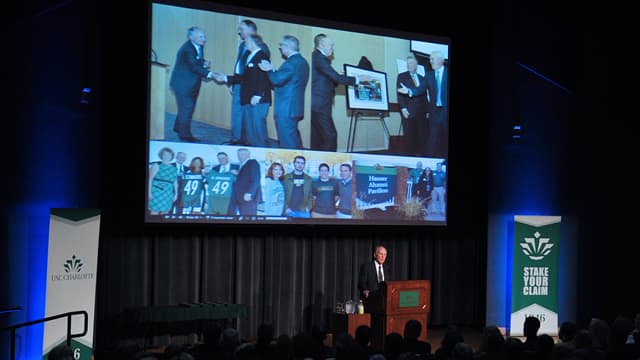
Chancellor Philip L. Dubois spoke of high expectations for the future in his annual “State of the University” address during convocation on Thursday, Aug. 18.
“As I begin my 12th year as Chancellor, I can confidently report that the state of this University is very strong,” Dubois said. “In fact, our operating fundamentals are as strong as they have ever been.”
University Convocation, which marks the traditional start of the academic year, is a time for the institution’s leaders to provide the campus community with an outline of short- and long-range plans. The meeting drew several hundred faculty and staff members.
UNC Charlotte has benefitted from two years of budgets “as good as I’ve seen in my time here, based largely on our enrollment growth but also reflecting the commitment of the governor, the General Assembly, President (Margaret) Spellings and the Board of Governors to ensuring access to higher education in the state of North Carolina,” Dubois said.
“Within or across political parties or governmental branches, there is virtually no disagreement over the idea that the University should remain accessible and affordable for the citizens of North Carolina,” he added.
In terms of financial support for higher education, North Carolina remains the fourth-ranked state in the nation in terms of state appropriations per student, he said.
“Without question, our elected leaders recognize that ensuring access to a high quality post-secondary education requires modern and functional facilities,” Dubois said. That understanding led to placement of the $2 billion Connect NC Bond measure, which will provide $980 million to UNC campuses for new facilities, including $90 million at UNC Charlotte for a long-deferred science building.
Among other topics Dubois discussed were:
-
The addition of doctoral programs in business administration and in education research, measurement and evaluation, respectively. The University also has received approval from the Board of Governors to launch a new master’s program in cybersecurity, with a number of other new academic programs in varied stages of development.
-
Applications for undergraduate admissions at the freshman level this fall reached 17,500, a 7 percent increase over last year. Applications to the Graduate School increased by 11 percent to nearly 6,800. Fall enrollment could be close to 28,800 — about 800 more than last fall.
-
Externally funded research continues to expand, once again exceeding $40 million in a very competitive environment.
-
Private fundraising set another high watermark, exceeding $30 million this past year.
-
The allocation of $2.7 million for salary raises for non-faculty EHRA employees over and above the 1.5 percent approved for all employees. The University also will allocate $1.1 million for adjustments in the base pay of part-time lecturers.
-
A “Five-Year Capital Plan” will commit more than $400 million for new construction and renovation of older buildings on campus. About a quarter of this total, or $90 million, represents the state bond funding to construct the new Science Building